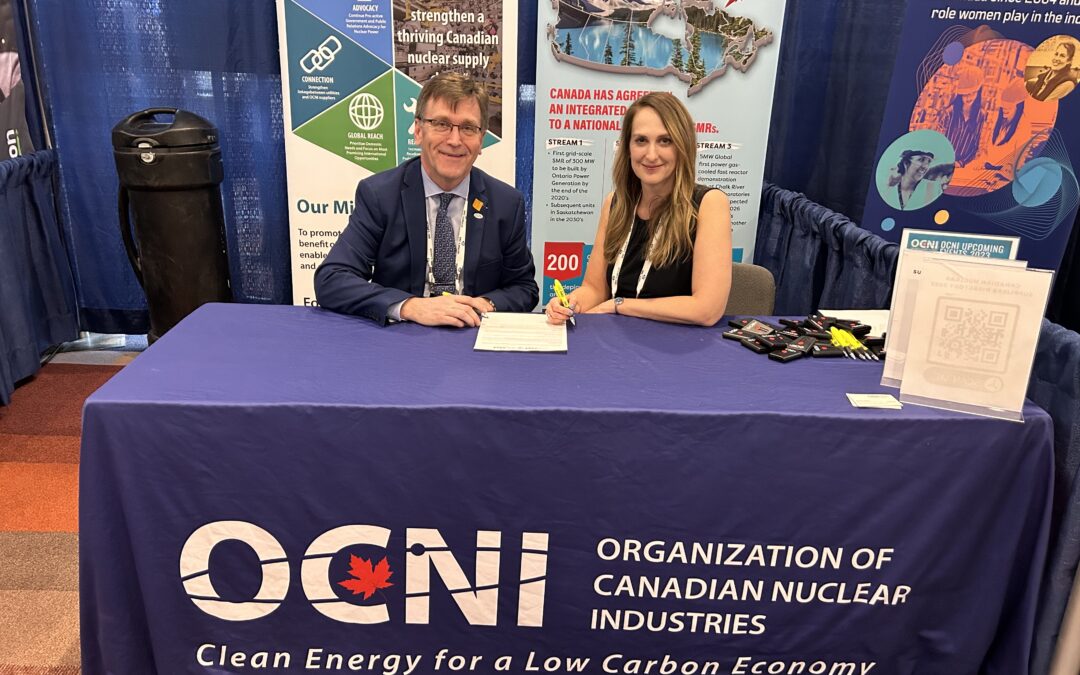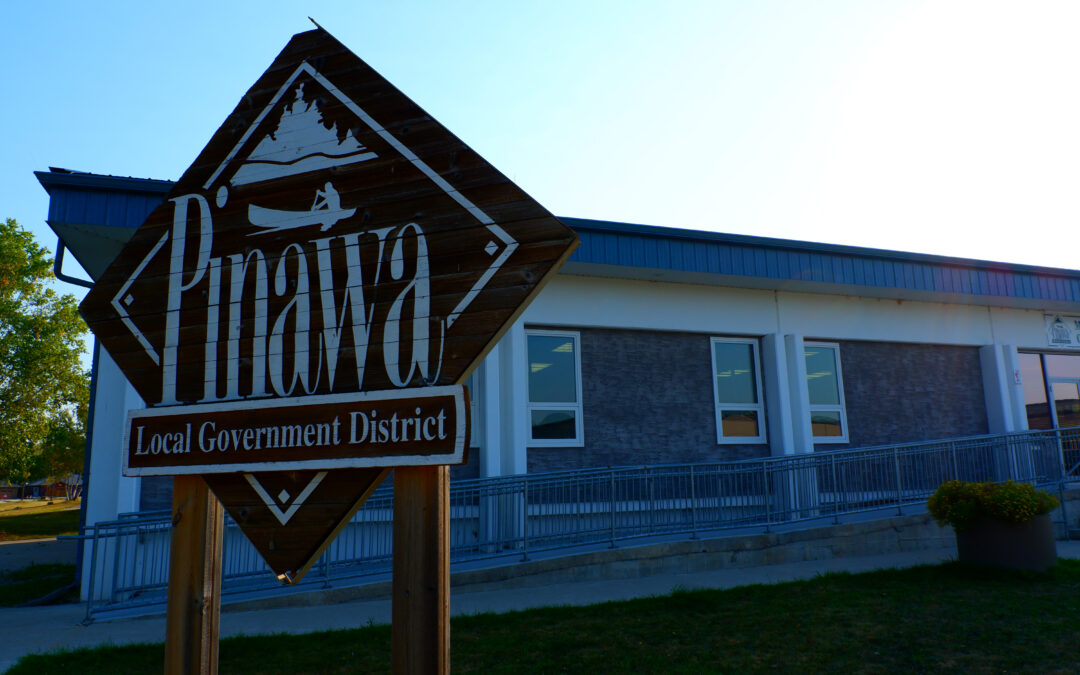
Sep 7, 2023
Atomic Energy of Canada Limited (AECL) and the Organization of Canadian Nuclear Industries (OCNI) have signed a Memorandum of Understanding (MOU) to collaborate and advance nuclear science and technology in Canada.
AECL and OCNI will collaborate on their shared goals to strengthen a thriving Canadian nuclear supply chain through innovation by sharing information and collaborating in the areas of health, safety and security, energy and the environment. This includes potential joint projects that support federal and provincial government priorities on the nuclear agenda, participating in trade missions and workshops that target the advancement of innovation, and communication on research activities and stakeholder engagement.
Some of this work will be delivered by Canadian Nuclear Laboratories (CNL), Canada’s premier nuclear science and technology laboratory and working under the direction of AECL. CNL is a world leader in the development of innovative nuclear science and technology products and services and will leverage AECL assets to serve as the nexus between government, the nuclear industry, the broader private sector and the academic community.
OCNI is an industry trade association of more than 210 leading Canadian suppliers to the nuclear industry in Canada and offshore, which promotes a robust nuclear power industry in Canada.
“AECL is thrilled to partner with OCNI in signing this MOU that will spur innovation in nuclear science and technology. Working in partnership with OCNI allows us to more closely align to the vibrant nuclear supply chain that has been so dedicated and committed to success of our industry and advancing nuclear technologies in their own right. Partnerships with industry are a key priority for AECL and is necessary to further drive progress and innovation for nuclear in Canada”, said AECL’s Amy Gottschling, Vice-President of Science, Technology and Commercial Oversight.
“OCNI looks forward to the important work that will arise out of this partnership. We have no doubt that our collaboration with AECL will result in important research and innovations for nuclear science. This agreement will enable us to deliver increased value to our members, something that is a crucial part of OCNI’s overall mission” share OCNI’s President and CEO, Bill Walker.
Together, AECL and OCNI hope that the MOU will help cultivate a closer relationship to collaborate and share research, knowledge, drive innovation and push boundaries that will strengthen the nuclear sector.

Jul 21, 2023
The weekend of July 14th represented the 60th anniversary of the Town of Pinawa, Manitoba, close to where Atomic Energy of Canada Limited’s (AECL) Whiteshell Laboratories is situated.
In 1963, the Town of Pinawa, was founded for the employees of AECL, who worked at the Whiteshell site. The Whiteshell site construction began the same year.
Located at the Whiteshell Laboratories in Manitoba, the WR-1 was the largest organically cooled, heavy water moderated nuclear reactor in the world and played an important role in building Canada’s scientific and industrial capacity. Originally built as a test reactor for a proposed Canada Deuterium Uranium (CANDU) power reactor, it was later used for nuclear fuel research and other programs.
In 1985, the WR-1 research reactor was shut down and in 1998, Whiteshell Laboratories was closed, and any work was transferred to AECL’s other site, Chalk River Laboratories (CRL), located in Chalk River, Ontario.
Today, Canadian Nuclear Laboratories (CNL) continues the decommissioning and restoration of Whiteshell Laboratories. Looking forward to the next chapter of the site, engagements have started to learn what future uses are important to the surrounding communities and Indigenous nations.
AECL representatives were happy to participate in the festivities in Pinawa to celebrate this important birthday!
Jun 9, 2023
Atomic Energy of Canada Limited (AECL), Canadian Nuclear Laboratories (CNL), and the Algonquins of Pikwakanagan First Nation (AOPFN) are pleased to announce that they have signed a historic long-term relationship agreement (LTRA) that formalizes relations between two of Canada’s leading nuclear organizations and this Algonquin First Nation. The agreement will establish a working group to serve as the basis for ongoing collaborations, and create a Neya Wabun (Guardian) Program that will establish a regular AOPFN monitoring presence at designated AECL sites, among other environmental, cultural and economic protection and promotion activities and programs.
The LTRA is the culmination of intensive efforts, negotiations and engagement to establish a productive relationship between the owner and operator of Canada’s national nuclear laboratories and the AOPFN, built on mutual respect and understanding, and cultivated through ongoing opportunities for dialogue and participation. It also resolves and addresses key areas of concern identified by the AOPFN, including environmental protection, radioactive waste management, cultural protection and promotion, and, the pursuit of collaborative economic and business opportunities.
“Pikwakanagan now has a significant say in their operations, incorporating traditional knowledge and values while protecting Algonquin Rights and the environment. Responsible and modernized management of existing onsite radioactive waste will be ensured, and importation of low-level radioactive waste will be limited. Given the reality of operations at CNL/AECL, this agreement is the best path forward as we seek to protect mother earth and ensure the safety of future generations.” Chief Greg Sarazin
“This is a historic milestone in our relationship with the Algonquins of Pikwakanagan,” remarked Fred Dermarkar, President and CEO of Atomic Energy of Canada Limited. “Reconciliation is a journey – and the long-term relationship agreement between AOPFN, AECL and CNL is an important step in healing as well as building trust, founded on transparency and mutual respect. We look forward to working collaboratively together in the future.”
“I want to express my sincere thanks and appreciation to the Algonquins of Pikwakanagan for putting their trust in CNL by entering into this long-term relationship agreement,” commented Joe McBrearty, CNL President and CEO. “At CNL, we believe that the inclusion of Indigenous knowledge into our projects and across all of our operations will help to improve the way we do our work, and to build understanding between CNL staff and Indigenous People. That is at the heart of this agreement and CNL’s Reconciliation Action Plan, and I am incredibly excited to be working together with AECL and the AOPFN towards a shared vision for the sites that we manage.”
Under terms of the agreement, an LTRA working group featuring representation from all three parties will be stood up to facilitate ongoing engagements and collaboration between the organizations. This is in addition to the creation of what will be known as the ‘Neya Wabun Guardian Program,’ which will establish a regular presence of AOPFN Guardians at CNL operations and AECL sites within the territory. The Neya Wabun program will provide AOPFN with the opportunity to monitor, and enable corresponding reporting back to the AOPFN. Through these ongoing engagements AECL and CNL hope to continue to maintain trust with AOPFN.
Another key focus of the LTRA is one of CNL’s major environmental remediation projects, the Near Surface Disposal Facility (NSDF) project, which would establish a modern engineered disposal facility for low-level radioactive waste at the Chalk River Laboratories campus designed to replace temporary storage, and dispose of legacy contaminated soils and aging infrastructure. The proposed project is currently under review by the Canadian Nuclear Safety Commission (CNSC) and is subject to federal assessment, a process which has been underway since 2017, under the Canadian Environmental Assessment Act.
Since 2020, AECL and CNL have participated in extensive engagements with the AOPFN. As a direct result of this process, CNL has made improvements to the project to address concerns raised through these engagements. With those changes in place and other AOPFN conditions and commitments met by CNL, the organizations have reached agreement on the NSDF project, and the AOPFN will provide its consent to CNL and the Canadian Nuclear Safety Commission (CNSC) to move forward with the construction of the proposed facility.


